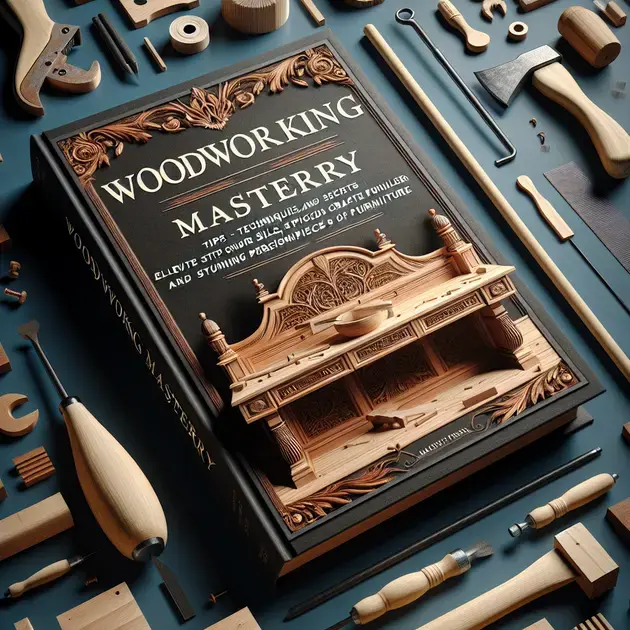Are you looking to master the art of woodworking? In this blog post, we will explore essential tips and techniques to help you improve your woodworking skills. Whether you are a beginner or an experienced woodworker, there is always something new to learn in this craft.
Woodworking has been gaining popularity in recent years as people seek to create personalized and unique pieces for their homes. With the right guidance and practice, you can develop a rewarding hobby or even a lucrative business. Let’s dive into the world of woodworking and discover the key strategies to succeed in this timeless craft.

Master the Art of Woodworking: Essential Tips and Techniques
Woodworking is a timeless craft that requires skill, precision, and creativity. Whether you are a beginner or an experienced woodworker, mastering the art of woodworking involves learning essential tips and techniques that will help you create stunning pieces of furniture and decor. One excellent resource for woodworking enthusiasts is the website Woodworkers Guild of America. This site offers a plethora of instructional videos, articles, and project plans to guide you through various woodworking techniques.
To start mastering the art of woodworking, it is essential to invest in high-quality tools. One popular online platform for purchasing woodworking tools is Woodcraft. They offer a wide selection of hand tools, power tools, and accessories for woodworking projects. Ensuring you have the right tools for the job will greatly enhance your woodworking experience and results.
Another crucial tip for woodworking mastery is to practice proper safety precautions. The Occupational Safety and Health Administration (OSHA) website provides comprehensive guidelines on woodworking safety. Understanding how to use tools safely, wear personal protective equipment, and maintain a clean workspace are key elements of safe woodworking practices.
Furthermore, honing your woodworking skills involves continuous learning and improvement. Consider enrolling in woodworking classes or workshops offered by institutions like the American Woodworkers Institute. These courses cover a range of topics, from basic techniques to advanced woodworking skills, and provide hands-on experience under the guidance of experienced instructors.
Mastering the art of woodworking also requires patience and perseverance. Rome was not built in a day, and neither is a masterpiece furniture piece. By consistently practicing and refining your woodworking skills, you will elevate your craft to new heights and create pieces that truly showcase your talent and dedication.
Unlocking the Secrets of Woodworking Mastery
Unlocking the secrets of woodworking mastery involves delving deep into the nuances of the craft and exploring advanced techniques that can take your woodworking skills to the next level. One valuable resource for uncovering these secrets is the Woodworker’s Journal website. This site features articles, tips, and tutorials from expert woodworkers, offering insights into the intricate details of woodworking.
To unlock woodworking mastery, it is essential to understand the properties of different types of wood and how they affect your projects. The Forest Products Laboratory (FPL) website provides extensive resources on wood properties, including strength, durability, and workability. By studying these properties, you can choose the right wood for each project and optimize your woodworking results.
Additionally, mastering woodworking secrets involves mastering the art of joinery. The Fine Woodworking website offers in-depth articles and video tutorials on various joinery techniques, such as dovetails, mortise and tenon, and box joints. Understanding and practicing these advanced joinery methods will enhance the quality and durability of your woodworking projects.
Exploring the world of woodworking finishes is another secret to woodworking mastery. The Minwax website provides a wealth of information on wood finishes, including stains, varnishes, and sealants. By learning how to apply different finishes correctly, you can enhance the beauty and longevity of your woodworking creations.
Furthermore, unlocking the secrets of woodworking mastery requires a willingness to experiment and push the boundaries of your skills. Don’t be afraid to try new techniques, tools, and designs in your woodworking projects. Embracing creativity and innovation will set you apart as a woodworking master and elevate your craft to new heights.
Elevate Your Woodworking Skills to the Next Level
To elevate your woodworking skills to the next level, it is essential to continuously push yourself to learn and improve. One effective way to do this is by participating in online woodworking communities like WoodNet Forums. These forums offer a space for woodworkers to connect, share knowledge, and seek advice on various woodworking topics.
Additionally, expanding your woodworking skill set involves exploring advanced woodworking techniques. The Woodworkers Institute website features instructional articles and videos on advanced techniques such as inlay work, wood carving, and marquetry. By mastering these techniques, you can add intricate details and designs to your woodworking projects.
Another key aspect of elevating your woodworking skills is investing in high-quality woodworking plans. Platforms like Wood Magazine offer a wide range of detailed project plans for woodworkers of all skill levels. Following well-crafted plans not only helps improve your woodworking accuracy but also exposes you to new techniques and designs.
To take your woodworking skills to the next level, consider collaborating with other woodworkers on joint projects. Websites like Woodworking Talk provide a platform for woodworkers to connect and collaborate on projects, sharing ideas and techniques to inspire one another. Working with fellow woodworkers can introduce you to new perspectives and approaches to woodworking.
Lastly, always strive for excellence in your woodworking projects. Pay attention to the details, aim for perfection in your craftsmanship, and take pride in the work you create. By setting high standards for yourself and continuously seeking to improve, you will elevate your woodworking skills to new heights and leave a lasting impression with your creations.

Mastering the Basics of Woodworking for Beginners
Woodworking can be a rewarding hobby that allows you to create beautiful and functional pieces of furniture or decor. For beginners, mastering the basics is crucial to ensure success in your woodworking projects. One of the first steps in mastering woodworking is learning about the different types of wood and their properties. Understanding which type of wood is best suited for your project can help you achieve the desired results.
Another important aspect of woodworking for beginners is learning how to properly use woodworking tools. From saws and drills to sanders and clamps, each tool plays a crucial role in the woodworking process. Taking the time to familiarize yourself with these tools and practice using them can help you improve your woodworking skills.
In addition to learning about wood types and tools, beginners should also focus on mastering basic woodworking techniques. This includes learning how to properly measure and cut wood, as well as how to join pieces together using techniques such as gluing, nailing, or screwing. Developing these fundamental skills is essential for building a strong foundation in woodworking.
Practice is key to mastering the basics of woodworking for beginners. The more you work on projects and experiment with different techniques, the more confident and skilled you will become. Don’t be afraid to make mistakes, as they are all part of the learning process. By practicing regularly and seeking out resources for guidance, you can improve your woodworking abilities and tackle more challenging projects.
Overall, mastering the basics of woodworking for beginners is a gradual process that requires patience, dedication, and a willingness to learn. By educating yourself on wood types, tools, techniques, and practicing consistently, you can lay the groundwork for a successful journey in woodworking.
Tips and Tricks for Woodworking Success
Whether you’re a beginner or an experienced woodworker, there are always tips and tricks that can help improve your woodworking skills and enhance the quality of your projects. One valuable tip for woodworking success is to invest in high-quality tools and materials. While it may be tempting to cut costs, using inferior tools can lead to subpar results and frustration. Investing in quality tools will not only improve the outcome of your projects but also make the woodworking process more enjoyable.
Another tip for woodworking success is to plan your projects carefully before starting. Taking the time to sketch out designs, create a materials list, and establish a timeline can help streamline the woodworking process and prevent mistakes along the way. Having a clear plan in place can also help you stay organized and focused throughout the project.
In addition to planning, it’s important to pay attention to detail in woodworking. From precise measurements to smooth finishes, the little details can make a big difference in the overall quality of your work. Taking the time to sand, stain, and finish your projects properly can elevate them from good to great.
Networking with other woodworkers can also be beneficial for woodworking success. Joining woodworking clubs or online forums can provide opportunities to learn from others, share tips and tricks, and gain inspiration for new projects. Building a community of fellow woodworkers can offer support and encouragement as you continue to develop your skills.
Lastly, don’t be afraid to challenge yourself and try new techniques in woodworking. Stepping out of your comfort zone and experimenting with different methods can help you grow as a woodworker and expand your capabilities. Embrace new challenges and see them as opportunities for growth and improvement.
Taking Your Woodworking Skills to the Next Level
Once you have mastered the basics and gained confidence in your woodworking abilities, it may be time to take your skills to the next level. One way to do this is by tackling more complex woodworking projects that push your abilities to new heights. Whether it’s building intricate furniture pieces or experimenting with advanced joinery techniques, challenging yourself can lead to significant growth and improvement.
Continuing education is another key aspect of taking your woodworking skills to the next level. Consider enrolling in woodworking classes or workshops to learn new techniques and expand your knowledge. Attending woodworking demonstrations or exhibitions can also provide valuable insights and inspiration for your projects.
Investing in specialized tools and equipment can also help elevate your woodworking skills. As you take on more advanced projects, having the right tools for the job can make a significant difference in the outcome. Researching and investing in tools that enhance your capabilities can open up new opportunities for creativity and craftsmanship.
Experimenting with different wood species and finishes can also help you enhance your woodworking skills. Each type of wood offers unique characteristics and challenges, and exploring a variety of options can broaden your understanding and expertise. Trying out new finishes and techniques can add depth and complexity to your projects, making them stand out even more.
Lastly, don’t forget to continue practicing and honing your skills as you strive to take your woodworking abilities to the next level. By challenging yourself, seeking new learning opportunities, investing in quality tools, and experimenting with different techniques, you can continue to grow and evolve as a woodworker.
Conclusion
In conclusion, mastering the basics of woodworking for beginners is a gradual yet rewarding journey that requires patience and dedication. Understanding wood types, familiarizing oneself with tools, and mastering woodworking techniques are essential steps to creating successful projects. Practice is key in enhancing skills, and embracing mistakes as part of the learning process is crucial for improvement.
Moreover, tips and tricks for woodworking success, such as investing in quality tools, meticulous planning, attention to detail, networking with other woodworkers, and embracing challenges, can significantly elevate the quality of your projects and enhance your skills. These aspects not only improve the outcome but also make the woodworking process more enjoyable and fulfilling.
Furthermore, taking woodworking skills to the next level involves tackling complex projects, continuing education, investing in specialized tools, experimenting with different wood species and finishes, and consistent practice. By pushing boundaries, seeking new learning opportunities, and honing techniques, woodworkers can evolve and grow, creating masterful pieces that showcase their craftsmanship and dedication to the art of woodworking.